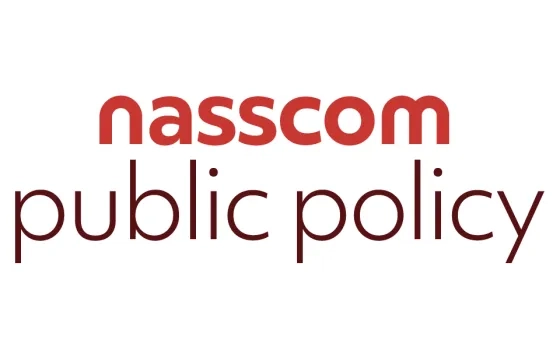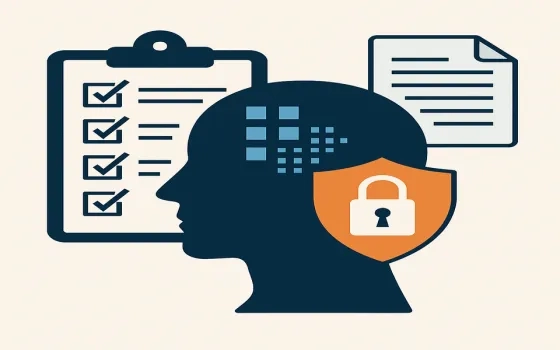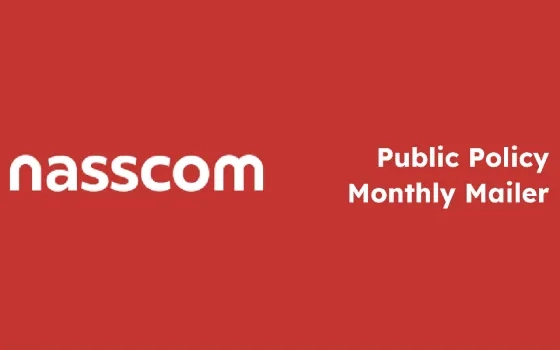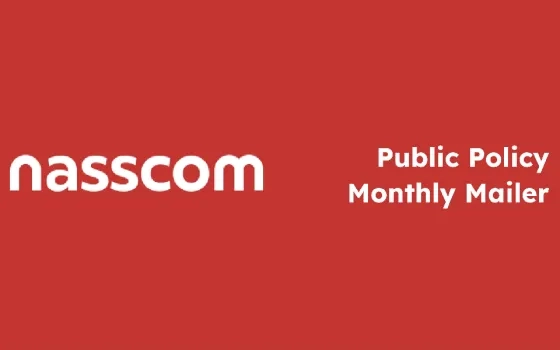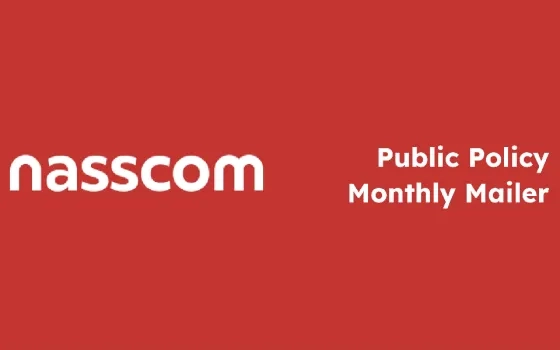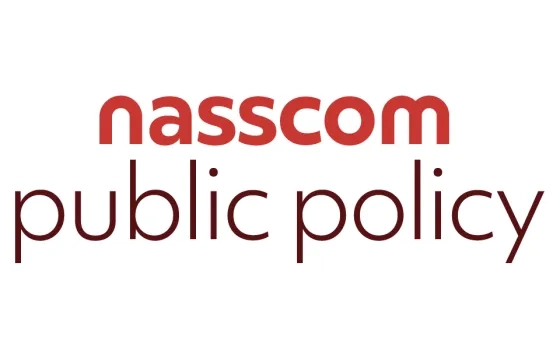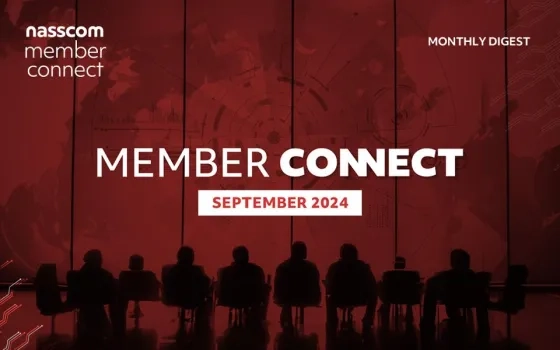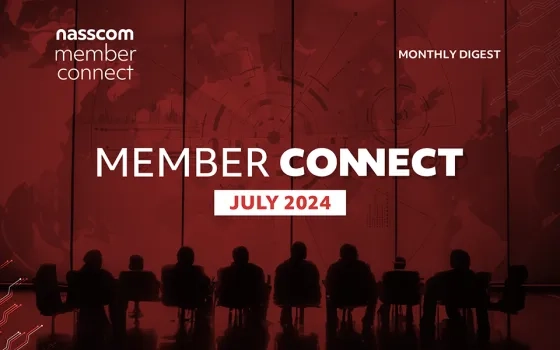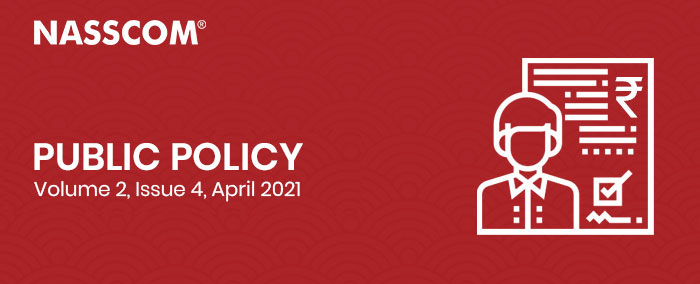
In Focus

 Haryana Reservation: Meeting with Haryana Chief Minister & Deputy Chief Minister
Haryana Reservation: Meeting with Haryana Chief Minister & Deputy Chief Minister

In an industry interaction organised by Government of Haryana on 25 March 2021, NASSCOM met the Hon'ble Chief Minister Shri Manohar Lal Khattar and Hon'ble Deputy Chief Minister Shri Dushyant Chautala and discussed the impact of the Haryana State Employment of Local Candidates Act, 2020 notified by the Government on 2 March 2021. The law mandates companies to recruit 75% of all new employees to have domicile in the State if the salary for the job is upto Rs. 50,000 pm. The State Government is planning to enforce the law with effect from 1 May 2021, i.e.,International Labour Day.
Raising its concerns, NASSCOM mentioned that such a law will be detrimental to the industries including established tech companies and the start-ups that are present in the State. Given that all the jobs in the industry have always been open to local population, such a legislation would be disadvantageous to the State's own interest as it would compel industries to shift or grow their operations to other States where there is no such pressure to recruit talent based on domicile status.
NASSCOM cited the findings of a recent survey (view here) conducted by it, wherein 80% of the respondents felt that this law will negatively impact their operations in the State including their existing and future investments. NASSCOM highlighted that it would be difficult to restore industry's confidence merely by concessions through the rules under the above law, as rules are susceptible to frequent changes and do not provide long term policy certainty. NASSCOM also conducted a survey for the impact of this law on start-ups (view here), wherein a majority of start-ups have clearly stated that this will negatively impact their future investment plans in Haryana in the short or long term and are concerned about the increased time and cost required to comply with this law.
NASSCOM requested Government to reconsider their decision of implementing this law or at-least keep the law in abeyance for two years, especially considering that the industry is still reeling under the impact of COVID-19. NASSCOM suggested that this period may be used by the Government to undertake skill building initiatives to enhance the employability of local candidates and NASSCOM and industry would be pleased to partner with the Government on such initiatives.
Submissions and Representations

-
 RBI: Extension of timeline for processing recurring online transactions
RBI: Extension of timeline for processing recurring online transactions

On 31 March 2021, the Reserve Bank of India (RBI) extended the timeline for processing of recurring online transactions by six months. The new deadline for stakeholders to migrate to the framework for processing of such transactions is 30 September 2021. The extension has been granted to prevent any inconvenience to the customers. This move by RBI comes after several representations by the industry, including NASSCOM, have been made to extend the earlier 31 March deadline, to ensure meaningful and effective compliance by all ecosystem participants.
On 23 March 2021, NASSCOM and DSCI jointly rolled out an anonymous survey among participating banks, merchants, card networks, payment aggregators (PA) and payment gateways (PG) and Prepaid Payment Instruments issuers, to ascertain the state of preparedness of the industry. Our interim findings, based on 18 complete and 29 partial responses, revealed that ecosystem participants urgently require an extension of 3 to 6 months to ensure complete and meaningful compliance with the e-mandate directive, so as to not cause any significant disruption to the e-commerce ecosystem and end-consumer experience.
Earlier, based on the interim findings of the survey, NASSCOM had made a representation to RBI to provide for such extension in compliance timelines. In 2019, RBI had introduced guidelines for processing e-mandate on cards for recurring transactions with a view to balancing the needs of card transaction security, and the needs of customer convenience (read more).
 RBI:Extension of timeline for non-bank PAs to comply with Guidelines on Regulation of PAs & PGs
RBI:Extension of timeline for non-bank PAs to comply with Guidelines on Regulation of PAs & PGs

On 31 March 2021, RBI extended the timeline for non-bank PAs by six months to ensure compliance with the Guidelines on Regulation of Payment Aggregators and Payment Gateways (PA/PG Guidelines). The new deadline for non-bank PAs to comply with the provisions of the PA/PG Guidelines is 31 December 2021. According to the Central Bank, the move is a "one-time measure" to enable payment system providers and participants to put in place workable solutions, such as tokenisation.
In a notification, RBI also clarified that this extension has been granted to PAs after considering the representations received from the industry seeking additional time for implementing the PA/PG Guidelines. In the same notification, the Central Bank also formally published the Clarifications to these Guidelines on Regulation of Payment Aggregators and Payment Gateways (Clarifications).
While the latest move by RBI is in line with what NASSCOM had asked, i.e. to maintain status quo till there is a workable solution, but it is not clear if a workable solution would be developed within the timeframe contemplated by the RBI. NASSCOM will work with the industry to discuss the way forward (read more).
 GST: Extension of exemption from IGST and compensation cess for Export Oriented Units
GST: Extension of exemption from IGST and compensation cess for Export Oriented Units

Central Board of Indirect Taxes and Customs (CBIC) issued Notification no. 19/2021 - Customs dated 30 March 2021 extending the benefit of upfront exemption from Integrated Goods & Services Tax (IGST) for Export Oriented Units (EOUs) by a period of 1 year, i.e, till 31 March 2022. However, since the Foreign Trade Policy 2015 - 2020 (FTP) has been extended only till 30 September 2021, it is unclear whether the IGST and compensation cess exemption will apply beyond September 2021.NASSCOM has been pursuing this request with the GST Policy Wing and made a representation on 17 March 2021, requesting for this extension without any time limit. This is a welcome move and will provide important relief to the industry as these companies have huge investments by way of capital expenditure (read more).
 DPIIT: Submission highlighting policy reforms to promote start-ups in India
DPIIT: Submission highlighting policy reforms to promote start-ups in India

India continues to be the world's third largest technology start-up ecosystem, with more than 1600 new start-ups added in 2020. The novel coronavirus (COVID-19) pandemic led to the disruption of business operations all over the globe and start-ups were amongst the worst hit segments during the first half of 2020. In this regard, NASSCOM has submitted a detailed submission to Department for Promotion of Industry and Internal Trade (DPIIT) on 18 March 2021, highlighting policy areas where support is needed from the government to boost recovery of start-ups, such as deferral of tax liability on grant of Employee Stock Ownership Plan (ESOP) to the time of sale of shares only, allowing all DPIIT recognised start-ups to avail the ESOP tax treatment and exemption from Minimum Alternate Tax (MAT) among others (read more).
 SEBI: Recommendations on the Consultation Paper on Introduction of Concept of Accredited Investors in Indian Securities Market
SEBI: Recommendations on the Consultation Paper on Introduction of Concept of Accredited Investors in Indian Securities Market

On 18 March 2021, NASSCOM provided its suggestions to Securities and Exchange Board of India (SEBI) on their Consultation Paper on Introduction of Concept of 'Accredited Investors' in Indian Securities Market. Our suggestions included, allowing Non-Resident Indians (NRI) that are investing using their Non-Resident Ordinary (NRO) accounts in India, to be treated as Indian residents for the purpose of eligibility criteria for becoming an AI; assessing the income and asset details for eligibility criteria on the basis of data furnished in the Income Tax Returns filed for three immediately preceding financial years; and increasing the validity of accreditation once granted to three years from the date of accreditation, rather than one year (read more).
 MEITY: Feedback on Draft Handbook of Intangible Technology Transfer Controls
MEITY: Feedback on Draft Handbook of Intangible Technology Transfer Controls

On 11 March 2021, NASSCOM submitted its feedback to the Ministry of Electronics & Information Technology (MEITY) on the draft Handbook on Intangible Technology Transfer (ITT) Control. Our main recommendations included, seeking clarity around the audit mechanism, setting-up helpdesk facility for SCOMET related queries, clarity around visa-vetting requirement by companies for preventing exposure of controlled technology in the hands of unauthorised foreign personnel etc. (read more).
 DPIIT: Suggestions for creating an enabling e-commerce ecosystem
DPIIT: Suggestions for creating an enabling e-commerce ecosystem

On 09 March 2021, NASSCOM submitted a set of suggestions to DPIIT, asking for government intervention in various ways in order to move forward in building an enabling ecosystem for the industry. Our suggestions included asking to facilitate Indian businesses to sell online by creating appropriate infrastructure, supporting small businesses, coordinating with state governments, promoting ease of doing business and facilitating e-commerce exports (read more).
 DGFT: Submission for review of Global Authorisation for Intra-Company Transfer (GAICT) scheme
DGFT: Submission for review of Global Authorisation for Intra-Company Transfer (GAICT) scheme

On 10 March 2021, NASSCOM submitted a representation to Directorate General of Foreign Trade (DGFT) to submit suggestions received by the industry for review of the Global Authorisation for Intra-Company Transfer (GAICT) scheme. The representation refers to Public Notice 20 which notified the GAICT scheme and Public Notice 65 for implementation of GAICT. Our suggestions included request for revision of the scope of a GAICT authorisation to include approved third-party entities which form part of the same supply chain, revision of the scope of a GAICT authorisation to include repair and return services, inclusion of items/software/technology imported under bulk authorisations under the coverage of the GAICT scheme, clarification that GAICT covers re-export of SCOMET items which have already been imported at the time of applying for GAICT etc. (read more).
 MCA: Submission requesting for deferment in implementation of notification requiring companies to adopt audit-trail equipped accounting software
MCA: Submission requesting for deferment in implementation of notification requiring companies to adopt audit-trail equipped accounting software

Ministry of Corporate Affairs (MCA) recently issued Notification No. GSR 205 (E) dated 24th March 2021 notifying Companies (Accounts) Amendment Rules, 2021 (New Rules). The new rules seek to insert proviso to Rule 3(1) of Companies (Accounts) Rules 2014, which requires businesses using accounting software for maintaining books of accounts, to only use such software which has a feature of recording audit trail of every transaction, creating edit log of changes made in books of account along with the date when such changes were made and ensuring that audit trail cannot be disabled.
These changes have to be incorporated in the Enterprise Resource Planning (ERP) software with effect from 1 April 2021, which is less than a week from the date of issuance of this notification, including audit trail in ERPs is a business reform and not just a law change. It will involve significant changes to be made to ERP systems, which will require time for end-to-end implementation. In this regard, NASSCOM made a representation to MCA on 26 March 2021 requesting them to defer implementation of Notification No. GSR 205 (E). We have also requested that a time frame of at least six months be given to businesses to enable them to plan and effect changes for smooth implementation of the Notification (read more).
 MCA: Representation regarding onerous obligations prescribed under the Companies (CSR) Amendment Rules 2021
MCA: Representation regarding onerous obligations prescribed under the Companies (CSR) Amendment Rules 2021

MCA recently notified Companies (Corporate Social Responsibility Policy) Amendment Rules, 2021 (Amendment Rules) to amend Companies (Corporate Social Responsibility Policy) Rules, 2014 (CSR Rules 2014). The Amendment Rules impose several new obligations on companies, which could result in hardship for companies. In this regard, NASSCOM submitted a detailed representation to MCA on 9 March 2021, highlighting key issues faced by the Industry along with suggestions to address the same. Our suggestions to MCA include doing away with the requirement of certification by Chief Financial Officer or the person responsible for financial management, applicability of certain rules with prospective effect, allowing companies to carry forward excess CSR spending to next financial year etc. (read more).
 GST: Applicability of Dynamic QR Code extended by 3 months - Now applicable from 1 July 2021
GST: Applicability of Dynamic QR Code extended by 3 months - Now applicable from 1 July 2021

CBIC issued Circular no 146/02/2021-GST on 23 February 2021 to clarify the contents of dynamic Quick Response (QR) Code. While these much-awaited clarifications are welcomed by the industry, there are still various aspects in relation to generation of QR code which require further clarification. These include clarity on definition of "unregistered persons", treatment of sales made through e-commerce platforms or online applications, among others. In this regard, NASSCOM made a detailed representation to Goods and Services Tax (GST) Policy Wing on 11 March 2021 requesting them to issue appropriate clarifications to the issues so that Industry can work towards smooth implementation of QR code requirement. Further, we have also requested that a time frame of six months be given to businesses to enable them to plan and effect changes for smooth implementation of QR code requirements. For this, we have requested for extension in timelines for waiver of penalty up to 30 September 2021 (i.e. additional six months) by way of amendment in notification no. 89/2020-Central Tax, dated November 29, 2020
Based on our representation, CBIC issued Notification no. 06/2021- Central Tax dated 30 March 2021 extending the applicability of Dynamic QR Code on business to consumer invoices from 1 April 2021 to 1 July 2021. This move will provide a huge relief to the industry (read more).
 GST: Submission requesting for removal of restriction on zero rating benefit for units in Special Economic Zones for facilities/amenities like canteen, first aid centre etc.
GST: Submission requesting for removal of restriction on zero rating benefit for units in Special Economic Zones for facilities/amenities like canteen, first aid centre etc.

As per Rule 11(5) of Special Economic Zones Rules, 2006 (SEZ Rules), units in SEZ are allowed to set-up canteen, public telephone booths, first aid centres, crèche and such other facilities subject to prior approval from the Approval Committee. SEZ units were hitherto procuring goods and services for setting up and operating these facilities without payment of any duty by availing exemption as provided for in s.7 and 26 of SEZ Act, 2005. Further, these supplies were also treated as "zero rated supply" under GST as per s. 16 of Integrated Goods & Services Tax Act, 2017 (IGST Act). However, Ministry of Commerce & Industries, vide Instruction No. 95 dated 11 June 2019 (Instruction), has directed that units setting up facilities/ amenities under Rule 11(5) of SEZ Rules will not be eligible for SEZ benefits and all procurements for setting up and operation of these facilities will have to be made on payment of applicable duties. This will lead to increase in cost of supplies made by such SEZ units. In this regard, NASSCOM made a representation to GST Policy Wing on 26 March 2021 requesting them to withdraw Instruction No. 95 dated 11 June 2019. Alternatively, it should only be made effective for facilities that are commonly used for unit holders and public. We have also requested that amendment suggested to s.16(b) IGST Act to limit the scope of 'zero-rated' supplies to procurements 'used for authorised operations', should also be done away with (read more).
 Representation to Telecommunication Engineering Centre on Audio Call conferencing Services
Representation to Telecommunication Engineering Centre on Audio Call conferencing Services

On 27 February 2021, NASSCOM made a representation to Telecommunication Engineering Centre (TEC) related to the proposed changes in the revised standards for Audiotex and Voice Mail Service (VMS). In the representation, we suggested that any changes to the Audiotex standards should be done in consultation with the industry specifically on the standards related to call conferencing services. Based on our suggestion, a meeting was convened by TEC, where industry players also stressed on the need to have a simple regulatory mechanism for call conferencing services.
Dialogue and Discussion
 Labour Reforms: Meeting with Ministry of Labour and Employment on Gratuity impact
Labour Reforms: Meeting with Ministry of Labour and Employment on Gratuity impact

NASSCOM along with several industry leaders met the Ministry of Labour and Employment (MoLE) on 10 March 2021 and discussed the concerns related to impact of Gratuity provisions due to change in the definition of Wages under the labour Codes. The meeting was chaired by the Labour Secretary and was attended by other senior officials from MoLE. In the meeting, NASSCOM reiterated the need to ensure the prospective applicability of gratuity provisions to minimise the unintended financial impact on the industry and clarify the definition of wages with respect to treatment of variable pay etc. NASSCOM continues to engage with Government on this front and shall keep the members updated on further developments. For more information, kindly write to deepak@nasscom.in.
 State IT-ITeS Policy: Interaction with Government of Rajasthan
State IT-ITeS Policy: Interaction with Government of Rajasthan

On 5 March 2021, NASSCOM had a discussion with the Special Secretary, IT, Government of Rajasthan on the upcoming IT-ITeS Policy of the State. In the discussion, we suggested that a joint industry - government council be formed to monitor and strengthen implementation of the policy. We also suggested that the State Government should significantly enhance the technology adoption of various departments and implement a model Request For Proposal (RFP) for all IT procurement of the State Government. To take this discussion forward, we will be organising an industry interaction with Govt of Rajasthan in April, to facilitate industry leaders from the IT-ITeS industry share their views and suggestions for the upcoming policy. For more information, kindly write to jayakumar@nasscom.in.
 State IT-ITeS Policy: Interaction with Government of Telangana
State IT-ITeS Policy: Interaction with Government of Telangana

Government of Telangana is in the process of adopting a new Information and Communication Technology policy (ICT policy) for the State. In this context, we held a discussion with the industry leaders from the State to understand their views and suggestions for the upcoming policy. Based on the inputs, we have suggested that the Government should introduce a digital platform through which companies can avail benefits, invest in improving Social infrastructure in Tier-II cities and adopt a separate policy for attracting Engineering Research & Development (ER&D) companies to state. Further, to streamline IT procurement of the State Government we suggested the State to implement a model RFP. For more information, kindly write to jayakumar@nasscom.in.
 FDI in e-commerce: Interaction with DPIIT
FDI in e-commerce: Interaction with DPIIT

On 19 March 2021, NASSCOM participated in a consultation organised by DPIIT to discuss India's Foreign Direct Investment policy (FDI policy) as it applies to e-commerce. In the discussion, we highlighted the successful impact of the FDI policy on India's retail story which looks at online+offline collaboration as the way forward for retail and banks on the existence of e-commerce players for on-boarding offline retailers. We also highlighted that for the FDI policy to continue to be successful, there is a need for a stable policy regime, and that concerns of non-compliance with the existing rules (if any) should be addressed by effective enforcement. For more information, kindly write to garima@nasscom.in.
 Strengthening India's economic recovery and growth: Interaction with Hon'ble Commerce and Industry Minister
Strengthening India's economic recovery and growth: Interaction with Hon'ble Commerce and Industry Minister

On 25 March 2021, NASSOCM participated in a consultation organised by Ministry of Commerce and Industry. In the meeting, NASSCOM gave an update on the IT/ITeS industry's performance and suggestions for further strengthening economic recovery and growth. We also highlighted the negative impact of the recently announced Haryana Job reservation law on the IT/ITeS companies operating in Haryana and the need for central government's intervention in preventing its implementation. Keeping in mind the future of growth in India, we recommended certain measures that must be taken to make India a conducive environment for start-ups and requested that focus on e-commerce exports be placed for India's upcoming foreign trade policy. For more information, kindly write to garima@nasscom.in.
New and Upcoming
 Whitepaper on determination of Place of Supply under GST regime
Whitepaper on determination of Place of Supply under GST regime

The government has recently set up a Committee of Officers for Monitoring of Business Run through Online Platform for Tax Compliance (Committee). Based on recent interactions, we understand that the committee has been further split into 10 sub-groups viz. e-commerce operators for goods, online content delivery, banking and financial services, aggregators etc. We met with the Chief Commissioner, Gujarat, who is the co-convenor of the committee, and he gave us insights on the agenda of the committee. The committee, interalia, intends to verify:
- accuracy of reporting of sales made through e-commerce platforms;
- completeness of reporting of sales made through e-commerce platforms; and
- principle for determination of place of supply.
We are planning to present a whitepaper to the GST authorities describing industry practices on determination of place of supply for various categories of supplies under GST. For more information, kindly write to tejasvi@nasscom.in.
 Survey to assess impact of OSP reforms on the IT/ITeS industry
Survey to assess impact of OSP reforms on the IT/ITeS industry

As you may be aware, the Department of Telecommunications (DoT) introduced new guidelines for Other Service Providers (OSPs) on 5 November 2020. Given the significance of these guidelines, NASSCOM is rolling out a survey to get industry feedback on the impact of these reforms on the business and any gaps being faced by the industry related to implementation of the new regime. The findings of this survey will be shared with DoT in early April to highlight the impact and seek further clarifications towards addressing the industry requirements. We thus seek your active participation. Click here to participate.
 Call for inputs: Concerns regarding application of export control regime to export of Intangible Technology
Call for inputs: Concerns regarding application of export control regime to export of Intangible Technology

NASSCOM is preparing a document on frequently asked questions related to export control regime as it applies to intangible technology transfer. The objective is to present a ready-reckoner to the industry on certain aspects which require clarifications, such as, examples of when a licence may or may not be required, examples of what is or is not covered under 'information security (systems, equipments and components' - Category 8A5 Part II of the SCOMET List). In order for us to make this document more valuable, we are requesting for industry's inputs on what are the difficulties faced while determining the application of export control procedures to ITT. Kindly write to garima@nasscom.in to send your queries.
 Seeking Inputs: TRAI Consultation Paper on Licensing Framework for Satellite-based connectivity for low bit rate applications
Seeking Inputs: TRAI Consultation Paper on Licensing Framework for Satellite-based connectivity for low bit rate applications

Telecom Regulatory Authority of India (TRAI) issued a consultation paper on "Licensing Framework for Satellite-based connectivity for low bit rate applications" in March 2021. Given the high growth potential and wider application of low bit applications such as Internet of Things in various fields, the paper highlights the need for creating a favourable regulatory environment in order to enable and promote access to affordable satellite-based connectivity for both commercial as well as captive use. Last date for sending inputs to TRAI is 9 April 2021. Kindly send your inputs to deepak@nasscom.in and indrajeet@nasscom.in latest by 7 April 2021, enabling us to make timely submission to TRAI (read more).
 Roundtable on compliance with RBI's Payments Directives
Roundtable on compliance with RBI's Payments Directives

On 31 March 2021, RBI issued two directives on Guidelines on Regulation of Payment Aggregators and Payment Gateways and Framework for processing of e-mandates for recurring online transactions. While these directives come as a relief to the payments industry, there are certain challenges which needs to be highlighted to RBI in order to ensure proper compliance with the upcoming timelines pertaining to these directives. In this regard, NASSCOM is holding a roundtable to focus on discussing industry issues related to compliance with these directives and what should be the way forward. The date and time of the roundtable will be notified in due course of time.For more details, kindly contact komal@nasscom.in.
 Industry Consultation on Fintech Lending Report
Industry Consultation on Fintech Lending Report

NASSCOM is coming up with a report on Fintech Lending. This will be in addition to the feedback already submitted to RBI's 'Working Group on digital lending, including lending through online platforms and mobile apps' (WG). We are still working on the details of this report and will reach out to the industry for consultation accordingly. For more details, kindly contact komal@nasscom.in.
 Request for Inputs on GST issues faced by IT-BPM Industry
Request for Inputs on GST issues faced by IT-BPM Industry

NASSCOM periodically submits a consolidated memorandum to GST Council and GST Policy Wing highlighting key GST issues faced by our Industry across India. We are again in the process of identifying GST issues that needs Government intervention. Given that we are soon completing 4 years under the GST regime, the idea this time is to not send the entire set of issues, but to focus on 10-12 top issues that are impacting the Industry with considerable financial ramifications or issues that are causing adverse interpretations and prolonged litigation. Issues like classification as Intermediary, applicability of GST on Free of Cost (FoC) supplies, etc. will continue to be on top of the agenda. However, please do feel free to write in with any additional inputs you may have on these as well.
Also, do send us inputs on challenges that you may be facing on the GSTN portal. While these will not be included as a part of the main memorandum, we would be happy to collate any technical glitches/ issues that you are facing on the portal and file it as a part of a separate document to the CBIC as well as GSTN. Please send your inputs to tejasvi@nasscom.in by 10 April 2021.
Other Updates
 DGFT: Extension of Foreign Trade Policy and Handbook of Procedures by 6 months
DGFT: Extension of Foreign Trade Policy and Handbook of Procedures by 6 months

On 31 March 2021, DGFT notified the extension of FTP and Handbook of Procedures 2015 - 2020 (HBP) by 6 months, i.e., till 30 September 2021. Consequently, benefits under Advanced Authorisation (AA) scheme, Export Promotion of Capital Goods (EPCG) scheme, Export Oriented Units (EOU) and Software Technology Parks of India (STPI) scheme have also been extended for the said period. However, CBIC has notified integrated tax and compensation cess exemptions for these units till 31 March 2022. Therefore, it needs to be seen whether the IGST and compensation cess exemption will apply beyond September 2021. Moreover, nothing has been mentioned regarding the extension of Services Exports from India (SEIS) scheme. Therefore, it may be the case that no decision on continuation of the said scheme has been taken yet (read more).
 MoCA: Unmanned Aircraft System (UAS) Rules, 2021 notified by Government
MoCA: Unmanned Aircraft System (UAS) Rules, 2021 notified by Government

The final version of the UAS Rules, 2021 has been released by Ministry of Civil Aviation (MoCA), which was notified by the Government on 12 March. The move comes almost a year after the release of the draft version of the Rules. In June 2020, Directorate General of Civil Aviation (DGCA) released the draft Unmanned Aircraft System Rules, 2020 (UAS Rules) for public consultation. NASSCOM submitted its feedback to DGCA in July 2020. The key highlights of the final Rules include, categorisation and classification of UAS, No Permission- No Take-off (NPNT) policy adopted for all UAS except for those in the nano category; nano, micro and small UAS operations limited to within the visual line of sight and are prohibited from delivery of goods (read more).
 Amendments to Finance Bill, 2021 passed by the President
Amendments to Finance Bill, 2021 passed by the President

The Finance Bill, 2021 introduced vide Union Budget 2021-22 was recently approved by the President on 28 March 2021, with certain amendments. Basis our review of the proposals introduced vide Finance Bill, 2021 and feedback received from our members, NASSCOM had submitted a detailed post-budget memorandum to Ministry of Finance (MoF) highlighting concerns and recommendations to strengthen the budget proposals. The document can be accessed here.
The relevant amendments approved in Finance Bill, 2021 are with respect to scope of equalisation levy, rephrasing of the definition of "liable to tax", taxation of slump sale at fair market value of capital asset transferred, amongst others. While, some of the recommendations have been accepted, we will continue to work with MoF to get clarity on the other aspects highlighted in our post-budget memorandum (read more).
 Compliance with Telecom Communications Customer Preference Regulations 2018
Compliance with Telecom Communications Customer Preference Regulations 2018

TRAI has reached out to NASSCOM regarding compliance with the Telecom Communications Customer Preference Regulations (TCCCPR), 2018. The Telecom Regulator in July 2018 had notified a regulatory framework to curb the problem of Unsolicited Commercial Communications (UCC). As per the regulations, senders of commercial communications are required to register themselves with the Access Service/Telecom Service Providers (TSP). Furthermore, they are required to follow specific templates for sending bulk communication messages. TRAI has mentioned non-compliance by entities despite TSPs being ready with the new system, and has therefore highlighted the need to raise awareness to ensure strict compliance with the regulation (read more).
 Supreme Court holds that payment to non-residents for imported software cannot be characterised as 'royalty'
Supreme Court holds that payment to non-residents for imported software cannot be characterised as 'royalty'

The Supreme Court (SC) issued a landmark ruling on 2 March 2021, confirming that amount paid by resident Indian end-users / distributors to non-resident computer software manufacturers / suppliers, as consideration for resale / use of computer software through End-user Licensing Agreements (EULA) / distribution agreements, is not payment of royalty for use of copyright in the computer software, and that the same does not give rise to income taxable in India. Accordingly, the SC concluded that the person referred to in S.195 of the Income-tax Act, 1961 is not liable to withhold tax (read more).
 SEEPZ (Maharashtra): Movement of IT Assets are now allowed till 30 June 2021
SEEPZ (Maharashtra): Movement of IT Assets are now allowed till 30 June 2021

In continuation of our earlier update, we are pleased to share that SEEPZ authorities in Maharashtra have extended the current relaxations related to movement of IT assets outside of Special Economic Zones (SEZ) till 30 June 2021. NASSCOM had earlier requested the Government to extend the deadline in lieu of the on-going pandemic. We are thankful to the Government for considering our request. For any further information/ concerns, kindly write to deepak@nasscom.in (read more).
 SEBI eases norms for public listing of start-ups
SEBI eases norms for public listing of start-ups

SEBI recently approved various proposals with respect to framework of Innovators Growth platform (IGP) under SEBI (Issue of Capital and Disclosure Requirements) Regulations, 2018 (ICDR Regulations), with an objective to make the platform more accessible to companies in view of evolving start-up ecosystem. These include changes which allow Issuer companies, who have issued Superior Voting Rights (SVR) equity shares to promoters / founders, to list under IGP framework, for companies listed under IGP, stipulation for triggering open offer under Takeover Regulations, 2011, has been relaxed from existing 25% to 49%, etc. These measures will help in making the platform more accessible to companies in view of the evolving start-up ecosystem (read more).
 GST: E-invoice applicable for businesses with turnover exceeding INR 50 crore from 1 April 2021
GST: E-invoice applicable for businesses with turnover exceeding INR 50 crore from 1 April 2021

CBIC issued Notification No. 05/2021-Central Tax dated March 8, 2021 to implement e-invoicing for taxpayers with aggregate turnover exceeding INR 50 Crore in any of the previous financial years beginning from FY 2017-18, with effect from 1 April 2021 (read more).
 Summary of 26th report of the Standing Committee on Finance
Summary of 26th report of the Standing Committee on Finance

The 26th Standing Committee on Finance tabled its report on 16 March 2021 before the Parliament. The Committee in its report, has acknowledged that the COVID-19 pandemic has severely hit GST collections and therefore, the Government needs to initiate structural as well as enforcement measures to increase GST collection which has seen an upward trend in recent months. It also noted the recent successes in the drive against fake invoices and recognises the need for greater awareness about GST and punitive action in case of non-compliance (read more).
 GST: Transportation facility provided by Company to employees in terms of employment contract is not taxable
GST: Transportation facility provided by Company to employees in terms of employment contract is not taxable

The Authority for Advance Ruling (AAR), Uttar Pradesh in the case of North Shore Technologies Private Limited (Applicant) recently ruled that providing subsidised shared transport facility by the applicant to its employees in terms of employment contract through third party vendors, would not be construed as "supply of service" by the applicant to its employees (read more).
Copyright © 2021, NASSCOMAdvertise with us







 Haryana Reservation: Meeting with Haryana Chief Minister & Deputy Chief Minister
Haryana Reservation: Meeting with Haryana Chief Minister & Deputy Chief Minister
![[Analysis] Parliament’s Standing Committee Report Calls for Strengthening CCI and Proposes Refinements in the Digital Competition Bill](https://community.nasscom.in/sites/default/files/styles/560_x_350/public/media/images/For%20Blog%20-nasscom%20public%20policy%20960%20x%20600%20png_14.png.webp?itok=TVoaAkX5)



